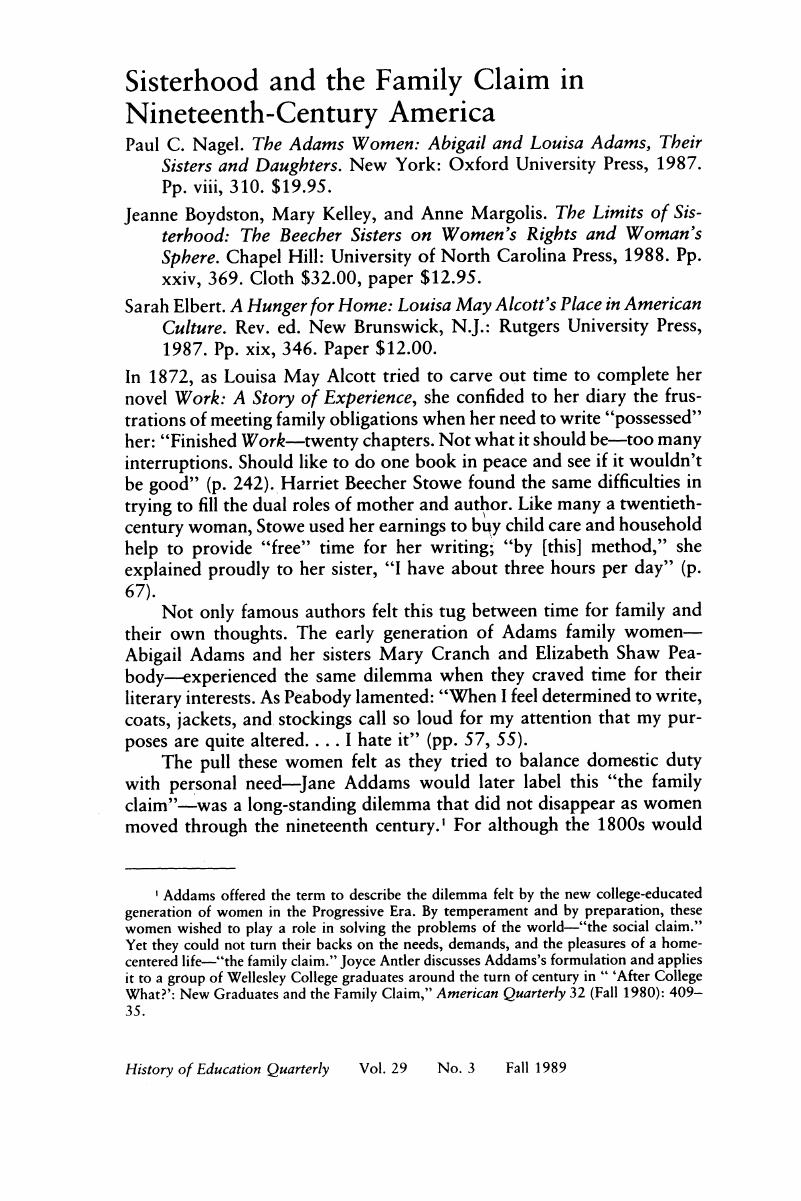No CrossRef data available.
Published online by Cambridge University Press: 24 February 2017

1 Addams offered the term to describe the dilemma felt by the new college-educated generation of women in the Progressive Era. By temperament and by preparation, these women wished to play a role in solving the problems of the world—“the social claim.” Yet they could not turn their backs on the needs, demands, and the pleasures of a home-centered life” the family claim.” Joyce Antler discusses Addams's formulation and applies it to a group of Wellesley College graduates around the turn of century in “‘After College What?’: New Graduates and the Family Claim,” American Quarterly 32 (Fall 1980): 409–35.Google Scholar
2 For examples of early uses of the work of these prominent women, see Smith, Page, Daughters of the Promised Land (Boston, 1970); Cott, Nancy F. and Pleck, Elizabeth H., A Heritage of Her Own: Toward a New Social History of American Women (New York, 1979); and Beth Norton, Mary, Liberty's Daughters: The Revolutionary Experience of American Women, 1750–1800 (Boston, 1980). On these particular families, see, for example, on Adams, Abigail, Withey, Lynne, Dearest Friend: A Life of Abigail Adams (New York, 1981); on the Beechers, Rugoff, Milton, The Beechers: An American Family in the Nineteenth Century (New York, 1981) and Kish Sklar, Kathryn, Catharine Beecher: A Study in American Domesticity (New Haven, Conn., 1973); on Alcott, , Bedell, Madelon, The Alcotts: A Family Biography (New York, 1980).Google Scholar
3 As preponderant and useful as the image of “women's sphere” has been in both nineteenth-century and current writing about women's role, Kerber suggests that historians should now move beyond this metaphor. She challenges women's historians to “deconstruct” the image and look more widely at questions of power hidden within the sphere. See Kerber, Linda K., “Separate Spheres, Female Worlds, Woman's Place: The Rhetoric of Women's History Journal of American History 75 (June 1988): 9–39.Google Scholar
4 The authors note that Hooker's reputation was damaged because of her support for free-love advocate Victoria Woodhull during the latter's public attack on Henry Ward Beecher's fidelity and honesty. That scandal, as well as Hooker's devotion to spiritualism and her outspoken views on women's rights, caused considerable displeasure within the Beecher family. The authors suggest that these instances quite likely prevented earlier writers from taking Hooker's work seriously. This, combined with the late release of Hooker's suffrage papers, may have led to a devaluation of Hooker's work.Google Scholar